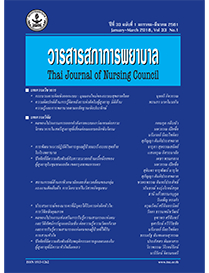Factors Related to Self-Care Behaviours in Older Adults with Heart Failure
Keywords:
heart failure, self-care behaviours, older adults, instrumental support, family relationshipAbstract
Abstract:
Objective: To study relationships that comorbidities, family relationship, instrumental
support, and trust in healthcare teams could have with elderly heart failure patients’
self-care behaviours.
Design: Descriptive correlation research.
Procedure: This study used the situation-specifc theory of heart failure self-care
model developed by Riegel, et al, as the conceptual framework. The sample consisted
of 116 older adults with heart failure, aged 60-79 years. Data were collected by using
Charlson Comorbidity Index (CCI), together with interviews on family relationship,
instrumental social support scales (for heart failure), trust in healthcare teams, and heart
failure patients’ self-care behaviours. The data were analysed using descriptive statistics
and Spearman's correlation coeffcient.
Results: The participants showed a low level of comorbidities (mean ±SD of
2.48 ±1.24) and scored highly on family relationship, instrumental support, trust in
healthcare teams, and elderly heart failure patients’ self-care behaviours (means ±SDs
of 68.85 ±12.69, 20.62 ±5.46, 44.16 ±4.28, and 83.70 ±10.64, respectively).
An intervariate relationship analysis revealed a statistically signifcant relationship between
the heart failure patients’ self-care behaviours and comorbidities, family relationship,
instrumental support, and trust in healthcare teams (r = 0.191, p < 0.05, r = 0.360, p < 0.01,
r = 0.348, p < 0.01, and r = 0.221, p < 0.05, respectively).
Recommendations: Nurses and healthcare teams should encourage family members
to improve family relationship and should provide instrumental support for older adults
with heart failure.
Downloads
References
2. Ambrosy AP, Fonarow GC, Butler J, Chioncel O, Greene SJ, Vaduganathan M, et al. The global health and economic burden of hospitalizations for heart failure: lessons learned from hospitalized heart failure registries. J Am Coll Cardiol 2014; 63:1123-33.
3. Riegel B, Vaughan Dickson V, Faulkner K. The situation-specifc theory of heart failure self-care. J Cardiovasc Nurs 2016;16: 226-35.
4. Riegel B, Lee CS, Ratcliffe SJ, De Geest S, Potashnik S, Patey M, et al. Predictors of objectively measured medication nonadherence in adults with heart failure. Circ-Heart Fail 2012;5:430-6.
5. Sayers SL, Riegel B, Pawlowski S, Coyne JC, Samaha FF. Social support and self-care of patients with heart failure. Ann Behav Med 2008;35:70-9.
6. Trojahn MM, Ruschel KB, Nogueira de Souza E, Mussi C, Naomi HV, Motta U, et al. Predictors of better self-care in patients with heart failure after six months of follow-up home visits. J Nurs Res Pract 2013;254-352.
7. Cameron J, Worrall-Carter L, Page K, Stewart S. Self-care behaviors and heart failure: does experience with symptoms really make a difference? Eur J Cardiovasc Nurs 2010; 9:92-100.
8. Dickson V, Lee C, Riegel B. How do cognitive function and knowledge influence heart failure self-care? J Mixed Methods Res 2011; 47:888-95.
9. Akbari kamrani A, Foroughan M, Taraghi Z, Charati J, Kaldi A-R, Ghanei N, et al. Self-care behaviors among elderly with chronic heart failure and related factors. Pak J Biol Sci 2014;17:1161-9.
10. Sebern M, Riegel B. Contributions of Supportive relationships to heart failure self-care. Eur J Cardiovasc Nurs 2009;8:97-104.115
11. Senchum W, Surit P, Noosorn N, & Kanokthet T. Factor predicting role of family’s menber in providing care and health promotion for the elderly in Thumbon Prawor Maesot district, Tak province. Journal of nursing and health sciences 2011;5:23-33. (In Thai).
12. Shahrbabaki PM, Nouhi E, Kazemi M, Ahmadi F. Defective support network: a major obstacle to coping for patients with heart failure: a qualitative study. Glob Health Action 2016;9:3076-7.
13. Cameron J, Rhodes KL, Ski CF, Thompson DR. Carers’ views on patient self-care in chronic heart failure. J Clin Nurs 2015;25:144-52.
14. Bonds DE, Camacho F, Bell RA, Duren-Winfeld VT, Anderson RT, Goff DC. The association of patient trust and self-care among patients with diabetes mellitus. BMC Fam Pract 2004;5:26.
15. Siabani S, Leeder SR, Davidson PM. Barriers and facilitators to self-care in chronic heart failure: a meta-synthesis of qualitative studies. Springerplus 2013;2:320.
16. Institute of geriatric medicine department of medicine services ministry of public health. MMSE–Thai 2002. Bangkok: Ministry of Public Health; 2002. (In Thai).
17. Chriss PM, Sheposh J, Carlson B, Riegel B. Predictors of successful heart failure self-care maintenance in the frst three months after hospitalization. HeartLung 2004;33:345-53.
18. Sundararajan V,Henderson T, Perry C, Muggivan A, Quan H, & Ghali WA. New ICD-10 version of the charlson comorbidity index predicted in-hospital mortality. J Clin Epidemiol 2004;57:1288-94.
19. Suwanno J, Petsirasan R, Suwanno J, Saisuk W, & Chanpradit A. Age and heart failure self-care: a
comparison of self-care maintenance between eldery and adults. Thai Journal of Nursing Council 2009; 24:36-48. (In Thai).
20. Crandall RC. Gerontology: A behavioral science approach: McGraw-Hill college;1991.
21. Sunsern R, Rattanagreethakul S, Lawang L, Tassanatanachai A, Viriya C, Sorujthamakul T, Patarakorn P. Evidence, problems, and health care needs for hypertension patients at Baan-bung district, Chonburi province. Journal of Nursing and Education. 2013;15:1-15. (In Thai).
22. Heo S, Lennie TA, Moser DK, Kennedy RL. Types of social support and their relationships to physical and depressive symptoms and health-related quality of life in patients with heart failure. Heart Lung 2014;43:299-305.
23. Hall MA, Dugan E, Zheng B, Mishra AK. Trust in physicians and medical institutions: what is it, can it be measured, and does it matter? Milbank Q 2001; 79:613-39.








